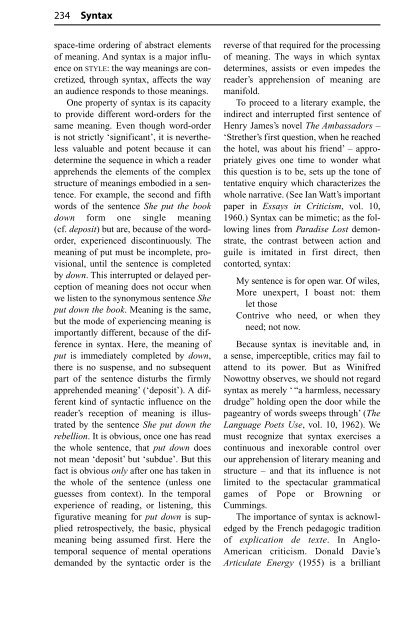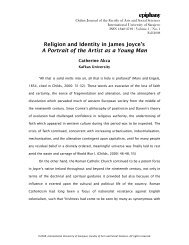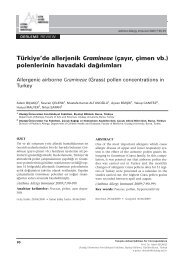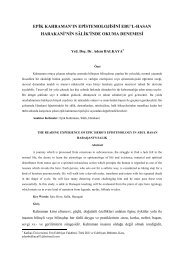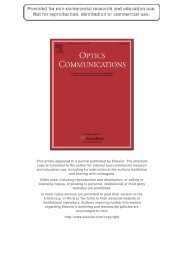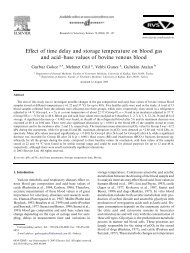The Routledge Dictionary of Literary Terms
The Routledge Dictionary of Literary Terms
The Routledge Dictionary of Literary Terms
You also want an ePaper? Increase the reach of your titles
YUMPU automatically turns print PDFs into web optimized ePapers that Google loves.
234 Syntax<br />
space-time ordering <strong>of</strong> abstract elements<br />
<strong>of</strong> meaning. And syntax is a major influence<br />
on STYLE: the way meanings are concretized,<br />
through syntax, affects the way<br />
an audience responds to those meanings.<br />
One property <strong>of</strong> syntax is its capacity<br />
to provide different word-orders for the<br />
same meaning. Even though word-order<br />
is not strictly ‘significant’, it is nevertheless<br />
valuable and potent because it can<br />
determine the sequence in which a reader<br />
apprehends the elements <strong>of</strong> the complex<br />
structure <strong>of</strong> meanings embodied in a sentence.<br />
For example, the second and fifth<br />
words <strong>of</strong> the sentence She put the book<br />
down form one single meaning<br />
(cf. deposit) but are, because <strong>of</strong> the wordorder,<br />
experienced discontinuously. <strong>The</strong><br />
meaning <strong>of</strong> put must be incomplete, provisional,<br />
until the sentence is completed<br />
by down. This interrupted or delayed perception<br />
<strong>of</strong> meaning does not occur when<br />
we listen to the synonymous sentence She<br />
put down the book. Meaning is the same,<br />
but the mode <strong>of</strong> experiencing meaning is<br />
importantly different, because <strong>of</strong> the difference<br />
in syntax. Here, the meaning <strong>of</strong><br />
put is immediately completed by down,<br />
there is no suspense, and no subsequent<br />
part <strong>of</strong> the sentence disturbs the firmly<br />
apprehended meaning’ (‘deposit’). A different<br />
kind <strong>of</strong> syntactic influence on the<br />
reader’s reception <strong>of</strong> meaning is illustrated<br />
by the sentence She put down the<br />
rebellion. It is obvious, once one has read<br />
the whole sentence, that put down does<br />
not mean ‘deposit’ but ‘subdue’. But this<br />
fact is obvious only after one has taken in<br />
the whole <strong>of</strong> the sentence (unless one<br />
guesses from context). In the temporal<br />
experience <strong>of</strong> reading, or listening, this<br />
figurative meaning for put down is supplied<br />
retrospectively, the basic, physical<br />
meaning being assumed first. Here the<br />
temporal sequence <strong>of</strong> mental operations<br />
demanded by the syntactic order is the<br />
reverse <strong>of</strong> that required for the processing<br />
<strong>of</strong> meaning. <strong>The</strong> ways in which syntax<br />
determines, assists or even impedes the<br />
reader’s apprehension <strong>of</strong> meaning are<br />
manifold.<br />
To proceed to a literary example, the<br />
indirect and interrupted first sentence <strong>of</strong><br />
Henry James’s novel <strong>The</strong> Ambassadors –<br />
‘Strether’s first question, when he reached<br />
the hotel, was about his friend’ – appropriately<br />
gives one time to wonder what<br />
this question is to be, sets up the tone <strong>of</strong><br />
tentative enquiry which characterizes the<br />
whole narrative. (See Ian Watt’s important<br />
paper in Essays in Criticism, vol. 10,<br />
1960.) Syntax can be mimetic; as the following<br />
lines from Paradise Lost demonstrate,<br />
the contrast between action and<br />
guile is imitated in first direct, then<br />
contorted, syntax:<br />
My sentence is for open war. Of wiles,<br />
More unexpert, I boast not: them<br />
let those<br />
Contrive who need, or when they<br />
need; not now.<br />
Because syntax is inevitable and, in<br />
a sense, imperceptible, critics may fail to<br />
attend to its power. But as Winifred<br />
Nowottny observes, we should not regard<br />
syntax as merely ‘ “a harmless, necessary<br />
drudge” holding open the door while the<br />
pageantry <strong>of</strong> words sweeps through’ (<strong>The</strong><br />
Language Poets Use, vol. 10, 1962). We<br />
must recognize that syntax exercises a<br />
continuous and inexorable control over<br />
our apprehension <strong>of</strong> literary meaning and<br />
structure – and that its influence is not<br />
limited to the spectacular grammatical<br />
games <strong>of</strong> Pope or Browning or<br />
Cummings.<br />
<strong>The</strong> importance <strong>of</strong> syntax is acknowledged<br />
by the French pedagogic tradition<br />
<strong>of</strong> explication de texte. In Anglo-<br />
American criticism. Donald Davie’s<br />
Articulate Energy (1955) is a brilliant


